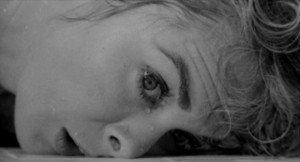
Perhaps one of the most admired American directors to emerge from the suspense genre, Alfred Hitchcock gained, and has maintained, an impressive reputation as the “master of horror”, a creator who ingeniously experimented with the psychosis, fears and mysteries that hide inside all of us and exposed those latent sentiments on the silver screen. His usage of close, almost intrusive, camera angles, his precise determination to be faithful to reality in every small detail, from fake blood to isolated motel locations and his enriching collaborations, such as with composer Bernard Herrmann in Psycho and prolific cinematographer Robert Burks in The Bird, speak of his impressive devotion and talent for film making. However, despite his innovation in film technique and storytelling, this director has been accused by feminist critics of remaining shamefully conservative when it came to his doomed heroines. The blonde adulterers, thieves and socialites that populated Hitchcock’s stark universe are, many critics believe, ill-fated embodiments of traditional female flaws (the temptress, the helpless damsel, the emasculating matriarch) who serve a subtle, yet powerful, moralistic purpose: to teach young woman about the consequences of inappropriate behavior. After a female protagonist commits a crime, whether it be a flaw in decorum or an actual illicit act, she is severely punished by a male character or a mysterious supernatural entity, like the avian murderers in The Birds. Although the punishers are always evil, they still represent an overwhelming force that crushes the hopes, independence and future of those daring Hitchcock beauties. In the end, Hitchcock seems to say, it is better to stay within the confinements of the domestic sphere or the arms of a strong man because who knows what morbid creature might be waiting out there to castigate you for having unorthodox ambitions. Writer Bidisha examines Hitchcock’s problematic cautionary tales in her article “What’s Wrong with Hitchcock’s Women”. Although she recognizes his technical talents, she blames him of lacking in the heroine department. Bidisha criticizes the director’s stereotypical, almost comically so, women and the way they all seem to helplessly fall into paths of perdition just waiting for their violent end to come. In Hitchcock’s films, the heroine’s job is “to lie, inflict and then suffer untold torments without ruffling her hem”. She cites several examples (Marnie, The Birds, Vertigo) where female characters are a bundle of selfishness, arrogance, incompetence and manipulation but she tells us not to worry because “they all get punished in the end”. Her accusations become more convincing when she comes around the subject of “The Mother”, a figure of paramount influence in the Hitchcockian psyche. For this particular female entity, Psycho becomes utterly relevant since it epitomizes the director’s disturbing relationship with motherhood and the psychologically devastating consequences of having mommy issues. The castrating dominion of Mother over a young, innocent Norman Bates constitutes yet another instance when the feminine is degradingly manipulated to become immoral and incredibly dangerous. Motherhood is turned into a farce of horror and suppression which only feeds Hitchcock’s sexist warning: even in their most accepted and natural roles, women can become agents of evil. The insidiously misogynistic purpose of the film is finally realized in the way Norman Bate resolves his issues. Not only does he murder his beloved mother when she takes in a lover, becoming a sexual and thus threatening individual, but he goes on to murder women to repress his own sexual impulses dressed in his mother’s clothes. He inhabits his punisher to punish others for being the independent, sensual women his mother had become right before her death. “He is ashamed of his sexual desires and projects his self-loathing on to the women he murders” Bidisha states, explaining the severe mental condition of Hitchcock’s avenger of feminine propriety. I also think that it is even more preserve to see a how the heroine is chastised in Psycho because, although a man murders Marion, his disguise means that a female presence is perpetuating Hitchcock’s system of suppressing the women of his film. Very much like in the Bate’s family, the victim becomes the victimizer.
Works Cited:
Bidisha, “What Is Wrong With Hitchcock’s Women”. The Guardian, October 2010.
http://www.theguardian.com/film/2010/oct/21/alfred-hitchcock-women-psycho-the-birds-bidisha
